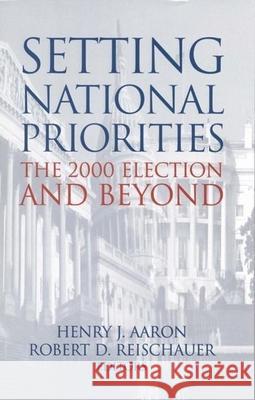Setting National Priorities: The 2000 Election and Beyond » książka
Setting National Priorities: The 2000 Election and Beyond
ISBN-13: 9780815774013 / Angielski / Miękka / 1999 / 516 str.
For the first time in 29 years, the US federal budget is in surplus and the need to reduce the deficit is not casting a pall over the policy debate. This new, highly accessible book examines the policy options that are available in this new environment to address the new and recurring challenges that face the nation. The book, which continues Brookings' acclaimed and influential Setting National Priorities series, will serve as a guide for understanding many of the complex issues that will be discussed during the presidential and congressional campaigns of 2000. Edited by Robert Reischauer and Henry Aaron, two of the nation's most noted budget experts, the book centers around three themes: providing opportunity in the domestic arena, restoring confidence in government, and adapting to the post-Cold War international environment. It tackles such critical issues as Medicare and Social Security, tax reform, and foreign policy spending, as well as many areas not included in previous editions, namely education, urban problems, the environment, trade, government renewal and reform, crime and drugs, and families. Destler, John DiIulio Jr, William Gale, Richard Haass, Bruce Katz, Robert Katzmann, Donald Kettl, Thomas Mann, Michael O'Hanlon, Paul Portney, Diane Ravitch, and Isabel Sawhill. Robert D. Reischauer and Henry J. Aaron are senior fellows in the Economic Studies program at the Brookings Institution. Reischauer was director of the Congressional Budget Office from 1989 to 1995 and is the editor of Setting National Priorities: Budget Choices for the Next Century (Brookings, 1996). Aaron is vice president of the National Academy of Social Insurance and coeditor of Economic Effects of Fundamental Tax Reform (Brookings 1996).











